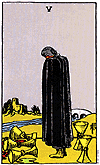
OPPOSING CARDS: Some Possibilities




OPPOSING CARDS: Some Possibilities

REINFORCING CARDS: Some Possibilities
The Five of Cups is about loss. On this card, we see a figure draped in black and covered in grief. He so dominates the card that it is hard to look beyond him. The Five of Cups refers to that time when the pain of a loss is most acute. This man is looking only at the overturned cups in front of him. For now, he cannot acknowledge the two cups that are still standing. Later, when he has healed somewhat, he will be able to see all that remains.
In readings, the Five of Cups can alert you to the possibility of a loss and its associated emotions - sorrow, regret, denial. The loss could be great or small. It could be tangible (money, possession, relationship, work), or intangible (dream, opportunity, prospect, reputation). You may already know what this card represents, but, if not, use it as a warning to help you avoid a loss, or at least reduce its toll.
You may feel discouraged by this card, but it does have a positive side. Every loss opens new possibilities for growth because every loss initiates change. Loss hurts because it is our emotional resistance to change. No matter how much we accept intellectually that we must go with the flow, if that flow separates us from what we love, our feelings say, "No!"
In a story from Zen Flesh, Zen Bones, the master Hakuin is falsely accused of fathering a child. His reputation in the village is ruined, but he accepts this loss and takes tender care of the child for a year. Suddenly, the real father appears, and Hakuin willingly yields the child to its parents, accepting loss again. We who are not Zen masters may not flow quite so lightly with events, but we can learn from this story. The more we struggle to hold on to what is gone, the more we suffer.